Tenormin 50
Tenormin 50 is a beta-blocker, a class of medications used to treat cardiac conditions. It helps treat high blood pressure (hypertension), irregular heartbeats (arrhythmias), chest discomfort with a painful tightness in the chest (angina pectoris), and protects the heart during the early stages of heart attack treatment (myocardial infarction). If hypertension persists for an extended period, the heart and blood vessels (arteries) may be harmed. It can induce a stroke, heart failure, or kidney failure by injuring the cerebral, cardiac, and renal arteries. In contrast, lowering blood pressure may reduce the risk of strokes and heart attacks.
Tenormin 50 contains atenolol, a chemical that relaxes blood vessels by inhibiting the body’s naturally occurring chemicals. As a result, Tenormin 50 reduces your high blood pressure and reduces your risk of future stroke, heart attack, other heart problems, and renal problems.
Tenormin 50 may be taken with or without food, as well as prior to or following a meal. The frequency with which you should take your prescriptions will be determined by your doctor based on your medical condition. Possible side effects include headaches, cold hands/feet, diarrhea, nausea, weariness, aching and exhausted muscles, depression, and disorientation. The majority of unwanted effects of Tenormin 50 do not require medical treatment and diminish with time. However, if the bad effects persist, visit a physician.
If you stop taking this medication on your own, your blood pressure may rise, which increases your risk of having a heart attack. Inform your doctor if you have kidney or liver problems, heart disease, or diabetes. Please let your physician know if you are pregnant or breastfeeding so that Tenormin 50 can be prescribed appropriately. It should not be administered to children younger than 12 years old. Inform your doctor that you are taking Tenormin 50 before undergoing any planned surgery. Due to the increased risk of hypotension (low blood pressure) associated with anesthesia, your doctor may advise you to stop taking Tenormin 50.
Avoid using Tenormin 50 if you experience cardiogenic shock (sudden stopping of blood flow to the heart). Please advise your doctor if you are allergic to this drug or are taking any other medications. If you have asthma, wheezing, or other breathing problems, allergic reactions (such as insect stings), chest pain (Prinz metal’s angina), poor blood circulation, first-stage heart block, diabetes, fast heartbeat, thyrotoxicosis (overactive thyroid), or kidney failure, you should not take Tenormin 50 and should instead consult a physician. Because Tenormin 50 can mask some of the symptoms of low blood sugar (hypoglycemia) and an overactive thyroid (hyperthyroidism), it is essential to monitor your blood sugar and thyroid profile.
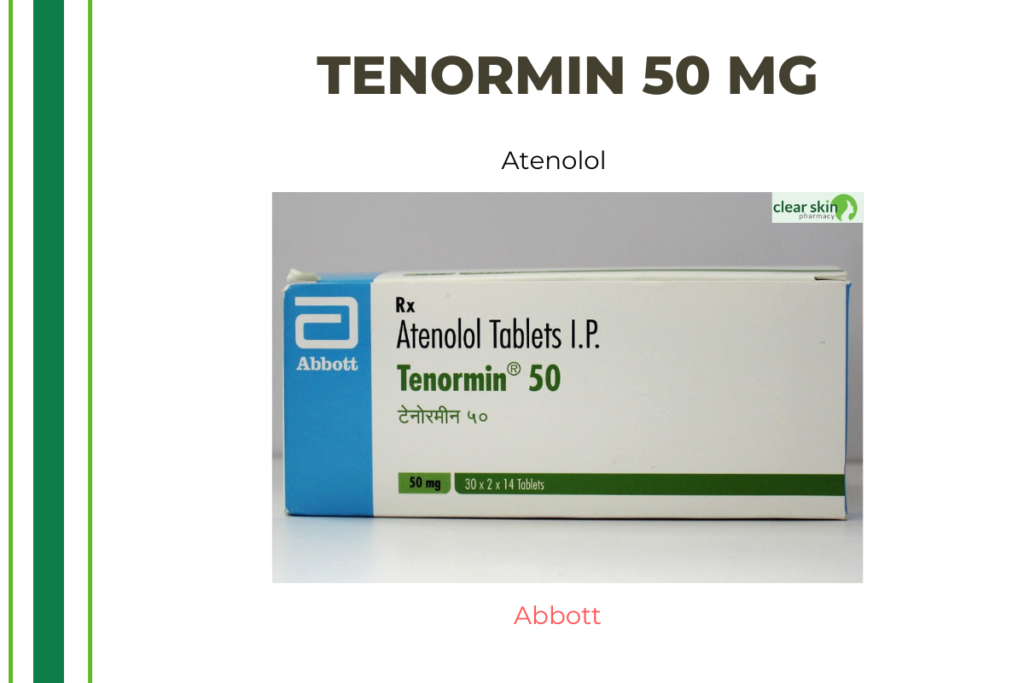
Tenormin 50 Applications
Blood pressure that is too high (hypertension)
Irregular heartbeat is a condition in which the heartbeat is irregular (arrhythmias)
Chest pain caused by the heart (angina)
Heart attack and stroke prevention
Medicinal Advantages
Tenormin 50 contains atenolol, a chemical that relaxes blood vessels by inhibiting the body’s naturally occurring chemicals. As a result, Tenormin 50 reduces your high blood pressure and reduces your risk of future stroke, heart attack, other heart problems, and renal problems. To be successful, this medication must be used consistently.
Use Instructions
Tenormin 50 may be taken orally, with or without food, or as directed by a physician. With approximately a glass of water, completely swallow the tablet. It should not be broken, crushed, or chewed. For optimal results, take the drug at the same time daily. Never take an excessive dose to make up for a missing dose.
Storage
Place in a cool, dry area out of direct sunlight.
Tenormin 50 Side Effects
Headache
Hands/feet are cold.
Diarrhea
I’m not feeling well (nausea)
I’m exhausted.
Muscle aches and fatigue
Depressed state of mind
Dizziness
Drug Recommendations
Do not discontinue Tenormin 50 without visiting your doctor first. Withdrawal from Tenormin 50 may result in changes in heart rate and blood pressure, as well as chest pain and a heart attack. To prevent these side effects, your doctor will reduce your dosage gradually over time. You should not take Tenormin 50 if you have a very slow heartbeat, asthma, a serious heart condition (sick sinus syndrome), or a heart obstruction. It should not be administered to children younger than 12 years old. Before taking Tenormin 50 Tablet 14’s, inform your doctor if you have a muscle disorder (myasthenia gravis, rhabdomyolysis), a breathing problem (COPD, bronchitis, emphysema), low blood sugar (hypoglycemia), low blood pressure (hypotension), depression, previous heart failure, liver/kidney disease, thyroid hormone disorder, adrenal gland cancer, or circulation problems (Raynaud’s syndrome)
Interactions Between Drugs
Other blood pressure medications (acebutolol, bisoprolol, carteolol, esmolol, metoprolol, nadolol, nebivolol, sotalol, lisinopril, enalapril, diltiazem, prazosin, terazosin, doxolol), asthma treatments (such as theophylline), and pain (disopyramide, quinidine, amiodarone, digoxin, adrenaline, epinephrine).
Atenolol is adversely affected by grapefruit and high-protein diets, according to the Food and Drug Administration. Consequently, it should not be taken with Tenormin 50. Combining Atenolol with multivitamins/minerals may diminish the effectiveness of Tenormin 50. If Atenolol is required, at least 2 hours should pass between administration of Atenolol and multivitamins/minerals.
Diabetes, asthma, cardiogenic shock (when the heart fails to pump enough blood to the body), heart valve difficulties (stenosis), low blood pressure (hypotension), coronary heart disease, liver disease, and heart failure are contraindications for atenolol.
Safety Suggestions
ALCOHOL
Consuming alcohol while taking Atenolol can produce dizziness or lightheadedness.
PREGNANCY
Atenolol should not be taken unless prescribed by a physician. Atenolol is categorized as a Category D pregnancy drug. Women who are pregnant should avoid using Atenolol because it has been linked to intrauterine growth restriction and has been shown to cross the placental barrier.
BREAST FEEDING
It should be used with caution, and a physician should be consulted prior to use. Before prescribing them to you, your physician will weigh the benefits and potential risks. Low blood sugar (hypoglycemia) and bradycardia are hazards for neonates (slow heartbeat or rate).
DRIVING
Only operate a motor vehicle if you are physically and psychologically healthy. If you feel dizzy after taking this medication, you should not drive or operate any machinery or automobiles.
LIVER
If you have a history of liver illness or condition, you should exercise caution when taking Atenolol. Your physician may need to adjust the dosage. Please consult with a physician.
KIDNEY
It is not recommended that patients with renal failure or significant kidney damage take atenolol. Please consult with a physician. Before prescribing them to you, your physician will weigh the benefits and potential risks.
No habit formation
Advice on Diet and Lifestyle
Maintain a healthy weight by keeping your BMI within the range of 19.5-24.9.
Perform at least 150 minutes of regular physical activity or exercise every week, or around 30 minutes daily. This can help you reduce your high blood pressure by around 5 mm Hg.
It is advisable to consume a diet rich in whole grains, fruits, vegetables, and low-fat dairy products.
The optimal daily sodium chloride (table salt) intake for most persons is 2300 mg or less than 1250 mg.
Stopping smoking is the best method to minimize your risk of heart disease.
Chronic stress can elevate blood pressure, therefore you should avoid it. Spending time with and appreciating your loved ones is a stress-reduction and mindfulness approach.
Monitor your blood pressure daily, and if it swings excessively, contact your physician immediately.
Include omega 3 fatty acid-rich foods and beverages in your diet on a daily basis. Olive oil, soybean oil, canola oil, and coconut oil are some of the low-fat cooking oils that can help reduce blood pressure.
Recommendations
Patients with hyperthyroidism (overactive thyroid), lung issues (asthma), or diabetes should consult a physician before using Tenormin 50. Before prescribing Atenolol, your physician may suggest a diagnostic test.
Additional Information : This item is non-refundable.
Glossary of Diseases and Conditions
Blood pressure measures the force with which our heart pumps blood to all regions of the body. When blood pressure is excessively high, it is referred to as hypertension. This disease can lead to the development of calcified arteries (blood vessels), which restricts blood and oxygen flow to the heart. Angina (chest pain) and heart attack can both be brought on by hypertension (when blood supply to the heart is blocked). High blood pressure may result in brain injury (stroke) and renal failure. One can identify elevated blood pressure with a blood pressure monitor or sphygmomanometer. Systolic pressure is the force exerted as the heart pumps blood out. In contrast, diastolic pressure is the pressure in your heart when it is at rest between heartbeats. If your blood pressure is 140/90 mm Hg, the systolic pressure is 140 mm Hg and the diastolic pressure is 90 mm Hg. The optimal range for blood pressure is between 90/60 mm Hg and 120/80 mm Hg.
FAQs
Atenolol is utilized to address long-term or chronic issues. Even if your blood pressure is under control, you should continue to take your medicine. The discontinuation of Atenolol may increase the risk of heart attack, stroke, and hypertension. Immediately consult a physician if you are experiencing any discomfort.
Atenolol may be administered at any hour of the day or night. It is advisable to take it at a particular time.
If you are using a beta-blocker, your physician may advise you to avoid bananas and other foods high in potassium, such as papaya, tomato, avocado, and kale.
For the treatment of heart-related diseases and disorders, Atenolol is often taken over the course of weeks to months. However, long-term use without a doctor’s approval can be fatal. Therefore, take it for as long as your doctor recommends.
Atenolol might cause dizziness when lying down or sitting, so rise gently to avoid it. If you feel extremely dizzy, consult a physician and follow his or her advice.
Patients with hyperthyroidism (overactive thyroid), lung issues (asthma), or diabetes should consult a physician before using Tenormin 50. Before prescribing Atenolol, your physician may suggest a diagnostic test.


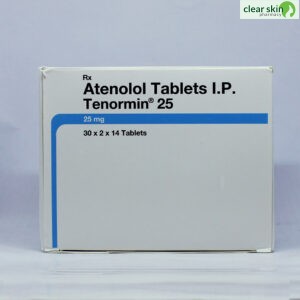

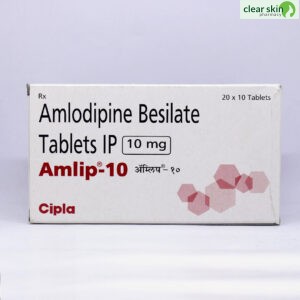
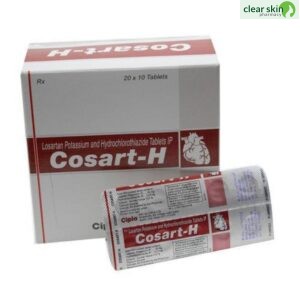
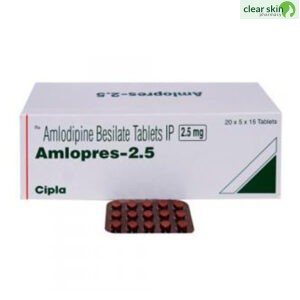
Be the first to review “TENORMIN 50MG 14 tablets”